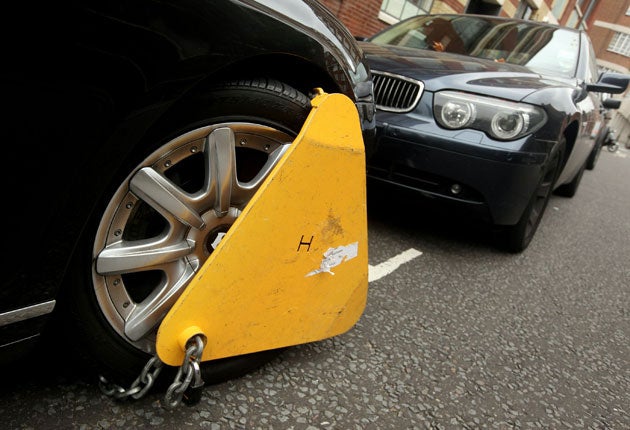Ministers' drive to keep Britain's motorists happy

Your support helps us to tell the story
From reproductive rights to climate change to Big Tech, The Independent is on the ground when the story is developing. Whether it's investigating the financials of Elon Musk's pro-Trump PAC or producing our latest documentary, 'The A Word', which shines a light on the American women fighting for reproductive rights, we know how important it is to parse out the facts from the messaging.
At such a critical moment in US history, we need reporters on the ground. Your donation allows us to keep sending journalists to speak to both sides of the story.
The Independent is trusted by Americans across the entire political spectrum. And unlike many other quality news outlets, we choose not to lock Americans out of our reporting and analysis with paywalls. We believe quality journalism should be available to everyone, paid for by those who can afford it.
Your support makes all the difference.Conservative ministers introduced a series of pro-car measures yesterday and declared the end of Labour's alleged "war on motorists".
The Communities Secretary Eric Pickles and Transport Secretary Philip Hammond scrapped rules forcing councils to impose higher parking charges, limit car spaces in new housing developments and obtain planning permission for recharging points for electric vehicles. They said drivers would benefit from lower parking fees and more space, while streets would become less congested.
Labour accused the Coalition of trying to distract drivers from sharp rises in petrol prices caused by this month's rise in duty and VAT. John Prescott, then Deputy Prime Minister, introduced the parking rules a decade ago as a way of promoting greener forms of transport such as walking, buses, trains and cycling.
Claiming they had been part of a counter-productive campaign against driving, the Coalition said they had unfairly penalised motorists, led to over-zealous parking enforcement and increased on-street parking congestion, putting at risk walkers and drivers.
"Whitehall's addiction to micromanagement has created a parking nightmare with stressed-out drivers running a gauntlet of unfair fines, soaring charges and a total lack of residential parking," complained Mr Pickles.
"The result is our pavements and verges crammed with cars on curbs, endangering drivers, cyclists and pedestrians, increased public resentment of over- zealous parking wardens, and escalating charges and fines. We're getting out of the way and it's up to councils to set the right parking policy."
Mr Hammond said the package was a key step in ending the war on the motorist. "For years politicians peddled the pessimistic, outdated attitude that they could only cut carbon emissions by forcing people out of their cars," he said. "But this Government recognises that cars are a lifeline for many people – and that by supporting the next generation of electric and ultra-low emission vehicles, it can enable sustainable green motoring to be a long-term part of future transport planning."
Introduced in 2000 and 2001, Labour's guidance initially required councils to insist upon a minimum 1.5 parking spaces per housing unit and to lay down a maximum in local development plans, although the minimum was dropped in 2006, leaving only the locally variable maximum. It also required councils to set parking charges to encourage use of greener transport.
Despite the Government's message, councils facing cuts will struggle to reduce charges. Stephen Wilkinson, Tory deputy mayor of East Cheshire Council, told the BBC Today programme: "I'm afraid it will be very difficult, considering the Government's settlement – a 30 per cent cut over four years."
Labour's shadow Transport Secretary Maria Eagle said: "Drivers will feel conned by these false promises that parking charges will be lower under the Tories. The Conservative-led Government is hitting many councils with front-loaded cuts that may actually encourage areas to raise parking charges, not lower them."
The Green Party said: "It's typical of the Coalition to call itself the greenest government ever while promoting the opposite of green policies. What's being proposed here will inevitably increase traffic both in city centres and in residential areas. There will be more pollution and... an increase in transport emissions."
Join our commenting forum
Join thought-provoking conversations, follow other Independent readers and see their replies
Comments